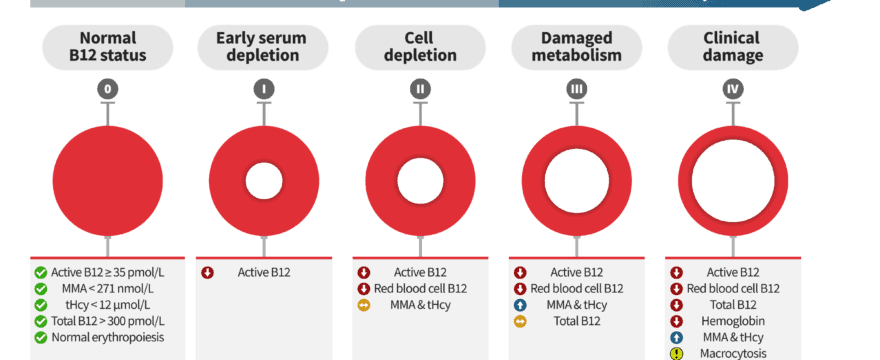Vitamin B12 deficiency is a legitimate worldwide epidemic. From vegans to omnivores, from the young to the elderly, people across the whole demographic spectrum are suffering from it. Just look at the numbers: 39% of the participants in the Framingham Offspring Study had low B12 (levels considered deficient or borderline deficient). The tragedy is that B12 deficiency is often misdiagnosed, thus it is left untreated.
What Is Vitamin B12 Deficiency?
Watch the next video when you have the time. Even though it lacks information about the MTHFR gene mutation, it does serve as a good foundation on B12 deficiency:
As you can see, it is no joke.
When you read our guide to B12, you’ll see that this vitamin is crucial for maintaining healthy nervous and immune systems. You need it to form red blood cells, repair DNA, reduce homocysteine levels, and maintain the so-important myelin sheath around your nerves. When the myelin recedes, brain, spinal cord and peripheral damage results. In fact, a prolonged B12 deficiency could easily lead to permanent nerve damage.
B12 deficiency occurs in four stages. It often begins with declining blood levels (stage I), progressing to low cellular concentrations (II), then to increased homocysteine levels and a decreased rate of DNA synthesis (III), and finally macrocytic anemia (IV). However, in some cases blood levels will look normal due to various reasons, and neurological changes will precede hematological changes. If you wait for anemia to show up, there may already be neurological damage. Therefore, normal blood tests aren’t reliable.

To be absorbed, vitamin B12 must follow a complex pathway that requires a number of steps. Normal function of the stomach, pancreas and small intestine are required, and any problem in any step of the pathway may lead to malabsorption and deficiency.
Chronic stomach inflammation, for example, is often associated with deficiency in B12. The inflammation gives rise to autoimmune reactions that damage the digestive system, often damaging the body’s ability to absorb vitamin B12. Intestinal malabsorption, rather than low dietary intake, can actually explain most cases of deficiency in vitamin B12.
For these reasons, B12 deficiency has been called a silent epidemic. It won’t present itself with severe symptoms at the beginning, but once discovered it may have already caused damage. The nerve system can’t regenerate itself, and once heavy neurological symptoms have kicked in, normal function may not be able to return.
Special Thanks
We’re extremely thankful to Sally Pacholok for her amazing contribution to raising the awareness of B12 deficiency. Read her book, Could It Be B12?, or watch the movie based on her amazing story. ELProductions have released it for free on YouTube:
Your Ultimate Guide to Low B12
Below is a complete resource on the lack of B12. It took us a few months to compile, so please share it with anybody you think it may benefit. Deteriorating cognition is quite often not the result of “aging”. Sometimes it’s the result of something else.
The result of B12 deficiency:







